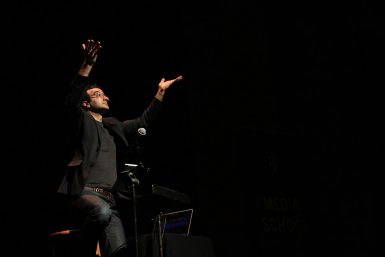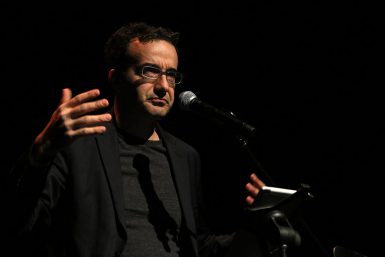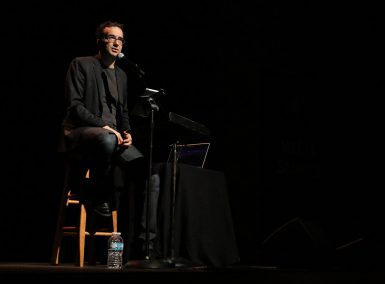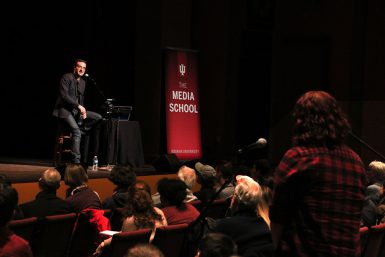Radiolab’s Abumrad uses self-doubt as part of creative process

“Sound is kind of touch at a distance.”
That’s how a music psychologist explained the soothing effects of the universal practice of mothers singing to babies from across a room, reassuring them that even though they’ve left their mothers’ arms, they still are connected.
And that’s what drives Radiolab creator and host Jad Abumrad’s ingenious use of sound and music as storytelling.
“I think one of the secrets of why people get into podcasting or radio is it’s a way to be with other humans while you are by yourself,” Abumrad told a full house at the Buskirk-Chumley Theater Monday night.
In his talk, “Gut Churn,” the last of The Media School’s spring Speaker Series, the Radiolab host and founder used sound clips, videos and animated graphics to immerse the audience in the creative process required to make an episode of the popular podcast, which is aired on public radio stations around the country.

“Gut Churn” refers to a colleague’s description of the anxiety and self-doubt when chasing a story and trying to figure out where it will lead. Abumrad said he not only overcomes but embraces setbacks, self-doubt and creative struggle in his work.
He proceeded to illustrate this to his audience. Sitting at a stool with an iPad for sound mixing, a laptop for controlling visuals on the projector and a microphone, Abumrad admitted he is a newcomer to the world of journalism. As a child, he wanted to be a musician. He scored soundtracks for make-believe movies in his bedroom and even dreamed of attending IU’s Jacobs School of Music.
While his love for sound and his degrees in music and creative writing helped Abumrad find his path, he said Radiolab’s style stems from years of his and his partners’ self-doubt.
“It wasn’t plans or strategies, it was gastric acid,” Abumrad said of the period when he was developing Radiolab. “That crappy, queasy space that we all have to swim through when we don’t know what we’re doing… That got us started.”
In addition to these feelings of uncertainty about storytelling, Abumrad struggled to find his own voice, both in a literal and metaphorical sense. With sketches and sound clips to illustrate, he listed “voices,” such as This American Life’s Ira Glass, podcaster Joe Frank and even broadcaster Walter Cronkite as influences he tried to mimic in the early days of his career.

“The power of the mic is that it initially creates this giant emptiness,” said Abumrad. “It initially feels so much bigger than you, so all of the other voices that have filled you up in your life rush in and fill that space.”
This eagerness to fill empty space is a coping mechanism he uses when drawing a creative blank, he said. An effective creative flow cannot be unleashed until an artist accepts and embraces that emptiness.
“If you’re taking the creative process seriously, it will always be uncomfortable,” Abumrad said.
Beyond taking the initial risk, Abumrad stressed the importance of patience in creative work. He described Ira Glass’ theory that artists are drawn to their work because they have good taste, but at the beginning of their careers, a gap exists between their standard of taste and the quality of work they create.
“On the one hand, you’ve got these grand ambitions. But on the other, you’ve got this keen awareness that you suck,” Abumrad said. “You need a mode of thinking where you can create fantastic new plans. But you also need to follow that with the thought that those ideas aren’t good enough yet. The negativity — as long as you don’t get stuck there — can propel you through your first idea into something novel.”

Abumrad also shared with the crowd his strategies for when negativity and dead ends in stories do get the best of him. He said one trick to getting himself out of a creative rut is to ask himself if he is fully committed to the story he is chasing.
“As reporters, we go out in the world, ostensibly looking for answers to things,” he said. “Sometimes, I slip into the misunderstanding that my job is to ask questions. That isn’t really my job. It’s allowing the question to possess me.”
He said having people he trusts next to him in these times of uncertainty can make all the difference. “Maybe the single best thing I can say to you guys about navigating through this doubt is just to do it with someone next to you,” said Abumrad.
During the Q&A portion of Abumrad’s talk, an audience member asked if he thought his combination of reporting and artistry is the future of journalism.
“I have no idea what’s to come in the future,” he said. “I know that there are a ton of kick-ass podcasts now that are trying really interesting things with sound and form, and if we had anything to do with that, I’m psyched.”
While in Bloomington, Abumrad talked to professor of practice Tom French’s Behind the Prize class. French, along with his wife Kelley Benham French, appeared on an episode of Radiolab about their daughter, who was born at 23 weeks gestation. Abumrad also met with the school’s American Student Radio student group.

